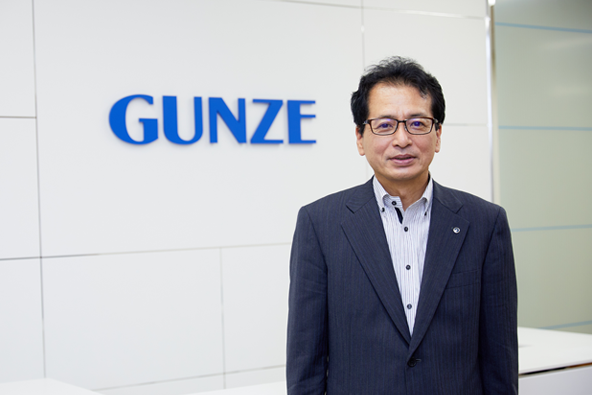

The project has increased security and convenience, and has also significantly improved operational efficiency.
GUNZE LIMITED, a long-established apparel manufacturer famous for underwear, innerwear, and stockings, undertook a project to completely migrate its Notes/Domino integrated information system, which had been used for more than 20 years since the 1990s. over a four-year period starting in 2017, the information sharing, document management, and e-mail systems to the cloud, and HENNGE One was implemented as the foundation for their integration. We spoke with Shinji Tsurumi, Manager of the IT Strategy Office, Technology Development Department, about the migration project, which overcame longstanding issues and improved security.
— Please tell us about the background of the migration to Notes.
We have been using Notes for more than 20 years since the 1990s, but in recent years, issues have emerged. One problem is that “the communication load is high and heavy. In our case, we have offices all over the country, sometimes even overseas. Notes was originally a client-server system, so it was also difficult to use from a smartphone or mobile device.
Another problem was that Notes email had a 7 MB limit for attachments. This was unpopular with employees, as they needed to send large attachments to clients and other parties. The Notes server was also burdensome in terms of archiving and other operations. Both the IT and user departments wanted to exchange and archive large files in a secure environment.

— Did you have any concerns about migrating a system that had been in use for more than 20 years?
Actually, migration was discussed several times in the past at the time of major version upgrades of Notes. We started the migration project in 2017, but we also considered migration tools in 2012, five years before that. At that time, Google’s cloud-based email was emerging, and we evaluated their products. At that stage, we decided that we were not ready to implement it yet, because SaaS secure environments, like HENNGE, were not as prevalent as they are today, and we were not confident in the security aspects.
— Was the decision to migrate a project a good one?
Naturally, the issue was how to show the cost-effectiveness of the project. However, considering maintenance costs, operation costs of the existing system, and human costs, the full-scale migration would have a higher ROI. In addition, we had to secure engineers with Notes skills that would taper off in the future, the future skills of our IT department personnel, and the fact that there was growing momentum for work style reform and work style changes within the company, so this was the only time we could make the transition. We did some “composing”.
At that time, it was still before the Corona disaster, so remote work was not so much a consideration, but if we had foregone the migration and stayed with Notes, I think we would not have survived the Corona disaster.
— Why did you choose HENNGE as the access infrastructure for the new system?
First, we divided the system into two information systems: e-mail and workflow/document management. We adopted Microsoft’s Office 365 (now Microsoft 365) for e-mail, and ArielAirOne (hereafter, Ariel) from Works Applications for workflow and document management.
At first, there was an option to implement Microsoft 365 for all workflow as well, but we decided that Ariel would be suitable considering the man-hours required to inherit and migrate the information assets of the Notes system. HENNGE One (HDE One at the time of adoption) was introduced as the foundation for the integrated use of these two systems. HENNGE One was the best choice in terms of seamless use of multiple cloud services and secure and efficient access from outside the company.
— What measures did you take to promote the new system after you migrated to it?
We thought it was important to maintain close communication with the departments using the system and incorporate their requests to some extent, so we held explanatory meetings throughout Japan. At the time of the project, we had not yet prepared a web conference environment, so we divided up the workforce and held a total of 71 briefings for 2,000 people. As a result, I think the project was accepted without resistance by the previous Notes users.
— Were there any issues surrounding the transition within the company?
The user department had some dissatisfaction with Notes, so the migration was accepted without resistance, but the issue was moving the DB and e-mail contents accumulated in the past. There was a huge amount of DB created by the user department and other departments, with more than 1,300 items, but after repeated requests to the site, we reduced the number of items to 800 and finally to about 466 after a cleanup before the start of the project. We also made it a policy not to migrate the previous logs for e-mail. We have established a policy of not migrating any unnecessary DB, contents, or mail logs.
— Please tell us about the effects of introducing HENNGE.
In a nutshell, HENNGE has improved security and convenience, and greatly enhanced operational efficiency. single sign-on,” and “transmission and archiving of large files.
For email, the combination of Office 365 email and HENNGE backup has greatly improved convenience and ensured security; we do not use the Office 365 email anti-message feature much and use the archiving feature to store emails in HENNGE One. I use the archiving feature of HENNGE One to store my emails.
I think the effect of being freed from the email restrictions of the Notes era and being able to safely exchange large files is also significant. In addition, although some employees’ mobile devices are basically provided by the company, we also allow employees to use their personal devices on an application basis. Therefore, we have a policy of using HENNGE’s secure browser for all work. This is to prevent data from being stored on personal devices and the risk of data being leaked outside the company.
Since we allow access to Microsoft 365 and Ariel with a single ID/password through HENNGE One, it is also safe in terms of “route management” of access. Ariel’s servers are also running in the Direct Cloud with a dedicated network connection to AWS, and HENNGE One serves as a secure gateway to AWS. security, authentication and access control, and route management.
— What are your future plans and requests for HENNGE?
Currently, we are using Ariel and Microsoft 365 for single sign-on, but in the future, we would like to use HENNGE as a gateway to BI and other data utilization tools, SFA, and sales management tools. As a company, we are aiming to reform the way of working by allowing people to freely decide where they want to work.
To this end, we expect HENNGE to further expand SSO and SAML certification for SaaS and cloud services. We believe that most of the major cloud services are supported, but we have had compatibility issues with some of the foreign-based security tools. I would like to see it coexist with other security tools and expand its circle of use.